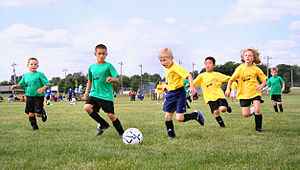Portal:Sports
The Sports Portal

Sport is a form of physical activity or game. Often competitive and organized, sports use, maintain, or improve physical ability and skills. They also provide enjoyment to participants and, in some cases, entertainment to spectators. Many sports exist, with different participant numbers, some are done by a single person with others being done by hundreds. Most sports take place either in teams or competing as individuals. Some sports allow a "tie" or "draw", in which there is no single winner; others provide tie-breaking methods to ensure one winner. A number of contests may be arranged in a tournament format, producing a champion. Many sports leagues make an annual champion by arranging games in a regular sports season, followed in some cases by playoffs.
Sport is generally recognised as system of activities based in physical athleticism or physical dexterity, with major competitions admitting only sports meeting this definition. Some organisations, such as the Council of Europe, preclude activities without any physical element from classification as sports. However, a number of competitive, but non-physical, activities claim recognition as mind sports. The International Olympic Committee who oversee the Olympic Games recognises both chess and bridge as sports. SportAccord, the international sports federation association, recognises five non-physical sports: bridge, chess, draughts, Go and xiangqi. However, they limit the number of mind games which can be admitted as sports. Sport is usually governed by a set of rules or customs, which serve to ensure fair competition. Winning can be determined by physical events such as scoring goals or crossing a line first. It can also be determined by judges who are scoring elements of the sporting performance, including objective or subjective measures such as technical performance or artistic impression. (Full article...)
Selected articles
Selected pictures
Did you know...
- ...that Ed Brown was an African-American slave who rose to become a Belmont Stakes-winning jockey and a Kentucky Derby-winning horse trainer?
- ...that Bearcat Stadium (pictured) of Northwest Missouri State University, originally opened in 1917, is the oldest stadium of any NCAA Division II school?
- ...that Australian sprinter Stanley Rowley is the only Olympic participant to win medals for two countries at the same Olympic Games?
- ...that Battlefield Baseball, a Japanese film, features elements of the sports, martial arts and horror genres, as well as including three musical numbers?
- ...that whipcracking, the art of using a whip to create a miniature sonic boom, is a competitive sport in Australia, where it was also elaborated into whipboxing?
Selected quote
Selected athlete
During a 20-year playing career, Bradman consistently scored at a level that made him, in the words of former Australia captain Bill Woodfull, "worth three batsmen to Australia". A controversial set of tactics, known as Bodyline, was specifically devised by the England team to curb his scoring. As a captain and administrator, Bradman was committed to attacking, entertaining cricket; he drew spectators in record numbers. He hated the constant adulation, however, and it affected how he dealt with others. The focus of attention on his individual performances strained relationships with some team-mates, administrators and journalists, who thought him aloof and wary. Following an enforced hiatus due to the Second World War, he made a dramatic comeback, captaining an Australian team known as "The Invincibles" on a record-breaking unbeaten tour of England.
Bradman retained a pre-eminent position in the game by acting as an administrator, selector and writer for three decades following his retirement. Even after he became reclusive in his declining years his opinion was highly sought. Bradman's image has appeared on postage stamps and coins, and a museum dedicated to his life was opened while he was still living. On 19 November 2009, he was inducted into the ICC Cricket Hall of Fame. (Full article...)
Selected team
A number of college members have rowed for the university against Cambridge University in the Boat Race and the Women's Boat Race. Barney Williams, a Canadian rower who studied at the college, won a silver medal in rowing at the 2004 Summer Olympics, and participated in the Boat Race in 2005 and 2006. Other students who rowed while at the college have achieved success in other fields, including John Sankey, who became Lord Chancellor, Alwyn Williams, who became Bishop of Durham, and Maurice Jones, who became Principal of St David's College, Lampeter. Another college rower, James Page, was appointed Secretary of the Amateur Rowing Association and coached both the Oxford and Cambridge University boat clubs.
The college boathouse, which is shared with the boat club of Keble College, is in Christ Church Meadow, on the Isis (as the River Thames is called in Oxford). It dates from 1964 and replaced a moored barge used by spectators and crew-members. (Full article...)
In this month
- June 6, 1946 – The Basketball Association of America, a predecessor to the National Basketball Association, is founded
- June 14, 1900 – The only game of Basque pelota (pictured) ever played in the Olympics takes place at the 1900 Summer Olympics
- June 15, 1909 – The international governing body of cricket, the International Cricket Council, is founded
- June 20, 1904 – Fédération Internationale de l'Automobile, the federation in charge of Formula One and World Rally Championship, is founded
- June 23, 1894 – Pierre, Baron de Coubertin founds the International Olympic Committee, the organizers of the Olympic Games and Youth Olympic Games
Topics
Related portals
Categories
Things you can do
 |
Here are some tasks awaiting attention:
|
Associated Wikimedia
The following Wikimedia Foundation sister projects provide more on this subject:
-
Commons
Free media repository -
Wikibooks
Free textbooks and manuals -
Wikidata
Free knowledge base -
Wikinews
Free-content news -
Wikiquote
Collection of quotations -
Wikisource
Free-content library -
Wikiversity
Free learning tools -
Wiktionary
Dictionary and thesaurus


























































